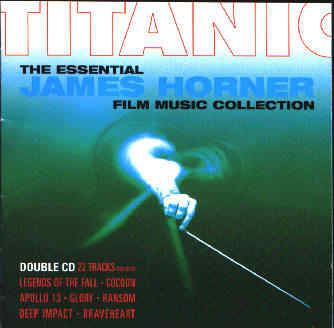Music Webmaster Len Mullenger |
||
Music Webmaster Len Mullenger |
||
James HORNER
Titanic: The Essential James Horner Film Music Collection:
 an anthology of highlights from 20
of his film scores (198097) an anthology of highlights from 20
of his film scores (198097)  SILVA SCREEN
FILMXCD197 2CDs [61:54] [52:45] (2 CDs for the price of one) SILVA SCREEN
FILMXCD197 2CDs [61:54] [52:45] (2 CDs for the price of one)
|
|
|

This collection takes its name from the film with which Horner has enjoyed
extraordinary chart success. The set is reasonably well documented with good
notes by David Wishart. At two for the price of one it is also extremely
generous.
The more I listen to this sort of collection the more tempted I am to move away from my preference for complete score recordings. Here at least we have variety and there is the opportunity for the record company to select the most striking material from each film.
Horner has a nice line in blatant rhetoric, generous-hearted romance and pastoral Americana à la Copland. We hear these lines to good advantage in this collection. The performances seem excellent and the recording is deep and spacious, highlit when necessary - after all this is not purist music. The Prague orchestra seems to have the idiom well under its fingers and lips, drawing on a rich deep-pile string tone. Nic Raine is a great advocate for the music. Neither conductor nor orchestra are apologists and play it for all (and sometimes more than) it is worth.
The Titanic music which opens the first disc and closes the second is glisteningly sweet and perhaps indebted to the New Age romanticism and the newish Celtic line characterised by Enya and Capercaillie. Glory, a fine film, has a charge which lifts unashamedly and gloriously from Orff's Carmina Burana but the end credits' music is voluptuously lovely and haunting. The Star Trek theme from Wrath of Khan struts arrogantly. Legends of the Fall superbly captures an atmosphere like a sad tune played on a pianola in the dusk with dust gently settling through the sunlit air. The Land Before Time sounds like Prokofiev (Classical Symphony). We're Back uses an Irish jig in the style of Benjamin Britten. The Ransom music is in the grand manner with trumpets and bells. Red Heat has tension racked up by tolling bells and culminates in a jazzy interlude. The Rocketeer music is Coplandlike and rather glorious. Braveheart's heroic end-title music sounds like Rózsa's El Cid and, for aptly Caledonian effect, deploys the Uilleann pipes.
The second disc 'launches off' with Apollo 13. Here Horner is back to Copland territory drawing on Appalachian Spring for the lyrical and the Third Symphony for the epic. The Cocoon music is excellent caressing and perhaps a couple of microns too thick on the sugar coating. Battle Beyond the Stars is all constantly swirling strings and high-piping woodwind. The music for Man Without a Face is contemplative. The music (at least this segment) for Willow is rather gross in my view - far too brassy, brash and brazen. Then, to ring the changes, we get a slice of 'country and western' influence in Field of Dreams. Patriot Games uses a cue depicting the remotely viewed (by heat-sensitive camera) attack on a terrorist camp. The idiom is bleak rather like the chilly wastes evoked at the end of Vaughan Williams' sixth symphony or perhaps in Holst's Egdon Heath. The Name of the Rose uses music in a rather distant and detached way. Commando (another Schwarzenegger action vehicle) deploys synthesisers in a way which no doubt suits the film but which offers little joy to the hearer of the music alone. Deep Impact turns back to Horner's trusted Roy Harris/Copland-esque Americana but this time in wide-open prairie mode.
All this goes to confirm Horner's high standing in the film music world. He is a multi-faceted composer who can draw on various idioms but who has a number of instantly recognised patterns. This is an attractive anthology disc very effectively using extended selections of music rather than very short cues.
![]()
Rob Barnett
Return to September Film Music Reviews